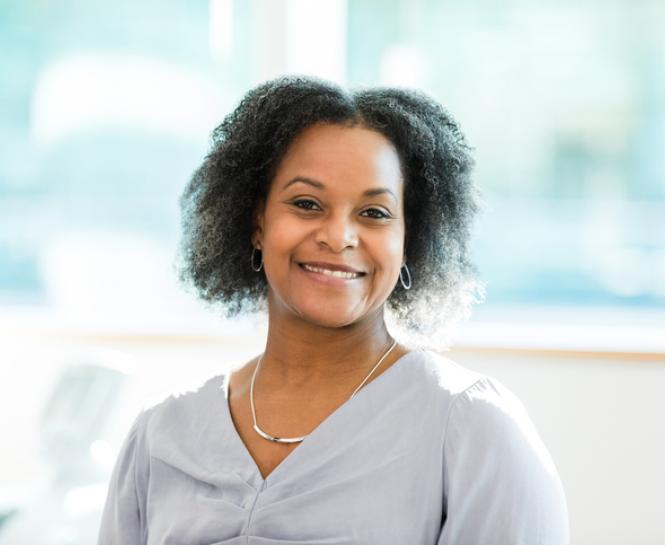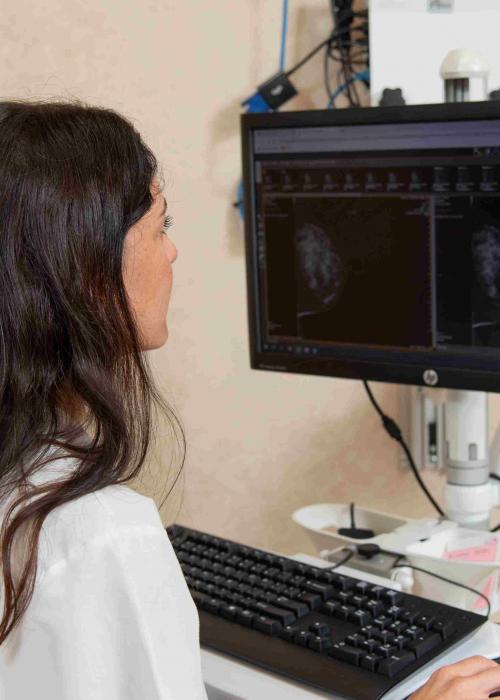Hearing the words “you have breast cancer” is a life-changing moment.
“A breast cancer diagnosis is, understandably, emotionally difficult and overwhelming with many uncertainties and questions about what happens next,” said Shridevi Singh, MD, Catholic Health Breast Surgical Oncologist/Breast Surgeon. “I reassure patients that a dedicated cancer care team will be with them every step and guide them through treatment options.”
Those options may include a lumpectomy or a mastectomy, two surgical procedures for breast cancer with several differences. Dr. Singh explained that choosing one of these surgical options depends on several factors.
In addition to surgery, your cancer treatment plan may consist of one or a combination of therapies, including chemotherapy, hormone therapy, immunotherapy, radiation therapy, and targeted therapy.
Will I need a lumpectomy or a mastectomy?
Your breast surgeon may recommend one of two types of breast cancer surgery—a lumpectomy to remove cancer from part of the breast or a mastectomy to remove the entire breast.
The type of surgery you choose will depend on factors including:
- What stage is the cancer?
- Where is the tumor located?
- Does it affect lymph nodes and tissue around the breast?
- What is the size of the tumor(s)?
- What is the size of the breast?
“For patients with early-stage breast cancer, personal preference plays a crucial role in the surgery they choose,” said Dr. Singh. “They may have concerns about a family history of breast cancer, or they tested positive for a genetic mutation like BRCA 1 or BRCA 2. Others worry about how their bodies will feel and look after surgery.”
She emphasized that all concerns are valid, and talking through them with your oncologist and breast surgical oncologist/breast surgeon will help guide the decision-making process.
“When you come to a Catholic Health Cancer Institute, our dedicated cancer experts listen to you and discuss all options to help create a personalized treatment plan for a successful outcome,” said Dr. Singh. “We want you to feel empowered to make the best decision.”
What is the difference between a lumpectomy and a mastectomy?
Lumpectomy (Breast-Conserving Surgery)
Breast-conserving surgery (BCS), commonly referred to as a lumpectomy or partial mastectomy, is a surgical procedure that removes the cancer tissue and some of the normal tissue around it (also called additional margins) without removing the entire breast.
Most patients who get breast-conserving surgery will need to follow up with radiation therapy.
“A lumpectomy benefits patients who do not want to lose their entire breast and are able and willing to undergo radiation therapy afterward,” said Dr. Singh.
Your breast surgeon will often recommend a lumpectomy if:
- The tumor is small compared to the breast.
- The tumor location in the breast allows minimal removal of breast tissue.
- There are no contraindications to you receiving radiation afterward if indicated.
If, after a lumpectomy, the pathology report shows that cancer cells may be left behind, then additional surgery is needed. A patient may require a mastectomy if those cancer cells cannot be removed by re-excising the area.
Mastectomy
A mastectomy removes the entire breast or both breasts to remove cancer. The recovery time is longer because it is a more complex surgical procedure. It also has additional side effects compared to a lumpectomy. For example, lumpectomy patients will retain sensation in their breasts, while mastectomy patients have a higher chance of losing sensation in their skin.
A significant benefit for patients who choose a mastectomy is that radiation therapy is not always needed. A post-surgery pathology report will show if additional cancer therapy is necessary.
Your breast surgeon will recommend a mastectomy if:
- Your tumor is large relative to your breast size.
- If you have cancer in multiple areas of your breast.
- You are unable to or do not want to undergo radiation therapy.
- If there is a contraindication to radiation therapy.
- If you have a genetic mutation that puts you at high risk for breast cancer.
Types of mastectomies
The type of mastectomy your breast surgeon recommends varies by how much tissue needs removal to ensure the removal of all cancer.
Simple (or total) mastectomy
In a simple (or total) mastectomy, a breast surgeon removes one or both breasts (double mastectomy), which includes the breast tissue, nipple, areola and skin.
Skin-sparing mastectomy
In a skin-sparing mastectomy, a breast surgeon removes the same amount of breast tissue as in a simple mastectomy, in addition to removing the nipple and areola. However, most of the breast skin remains, which creates a skin envelope for the plastic surgeon to reconstruct the breast.
Nipple-sparing mastectomy
In a nipple-sparing mastectomy, a breast surgeon removes breast tissue while preserving the breast skin, nipple and areola. Just as with a skin-sparing mastectomy, most of the breast skin remains, creating a skin envelope for the plastic surgeon to reconstruct the breast. The difference is the attempt to preserve the patient's nipple and areola.
Modified radical mastectomy
A modified radical mastectomy is essentially a simple total mastectomy combined with the removal of all the lymph nodes in the underarm area (axilla). A breast surgeon removes the breast tissue, nipple and areola in combination with the removal of underarm lymph nodes, also called an axillary lymph node dissection.
What is breast reconstruction surgery?
Breast reconstruction is done by a breast surgeon and plastic surgeon either at the same time as a mastectomy or scheduled at a later date post-recovery. It rebuilds the appearance of a breast using implants or tissue from other parts of the body.
“Breast reconstruction surgery is a personal choice and unique to each patient,” said Dr. Singh. “Talking to both your breast surgical oncologist/breast surgeon and a plastic surgeon can help you better understand what to expect during and after the surgery.”
Some patients also consider hidden scar surgery if they do not want a scar or disfigurement from their incision site. Talk to your breast surgeon about whether a hidden scar nipple-sparing mastectomy or hidden scar lumpectomy is an option for you.
Dr. Singh noted how she places high importance on scar placements and makes every attempt during every surgery to hide scars as long as it is safe to do so. “Aesthetic scar placements and using advanced oncoplastic techniques to reform the breast after tumor removal helps to lessen the emotional impact of breast surgery for my patients," she said.
Learn more about hidden scar surgery.
How do I prepare before and after a lumpectomy and a mastectomy?
A lumpectomy is typically an outpatient surgical procedure that does not require hospitalization. A mastectomy can sometimes require one or more days in the hospital.
Your doctor will review the risks, side effects, and benefits of both surgeries. After surgery, you will receive instructions on caring for the surgical area and incision site at home. Instructions will include:
- Monitoring and cleaning a drain—a tube that collects excess fluid buildup inside the chest. Mastectomy patients usually have drains, but they are rare for lumpectomy patients.
- Keeping the surgical area clean.
- Replacing surgical dressings and how often.
- Noticing the signs of an infection and when to call your doctor.
- Noticing any pain and when to call your doctor.
- Monitoring side effects such as swelling, tingling or numbness in the breast or arm.
- Contacting your doctor for follow-up appointments.
- Safely taking a bath or shower.
- How to take pain medication and when to resume other medications you were taking.
- Activity restrictions, including use of the arm.
- When ready, arm exercises to prevent numbness or stiffness.
- When and how long to wear your surgical bra.
Lumpectomy patients can typically resume everyday activities two weeks after surgery. Mastectomy patients can typically resume activities four weeks after surgery, but the recovery time can take up to eight weeks if they also have breast reconstruction surgery.
”You and your doctor will check in regularly to monitor recovery,” said Dr. Singh. “We encourage patients to take the time they need to heal and focus on their mental health as much as their physical health.”
She explained that patients often struggle emotionally and psychologically after surgery.
“Their body image, and with it their sense of self, has undergone a change that may lead them to emotional or mental health changes,” she said. “Our cancer care team reassures them that it is OK to have that reaction and that they are not alone. We provide resources like support groups so they can talk to others who are going through the same experience.”
Will surgery prevent cancer from recurring?
Patients who are concerned about recurring breast cancer will often ask if it is better to have a lumpectomy or a mastectomy.
Dr. Singh noted the following:
- Studies have shown there is a minimal risk of local recurrence of cancer for patients who have lumpectomy with radiation, but that should not deter a patient from choosing this procedure.
- Whenever breast conservation surgery is feasible, it should be encouraged, with the understanding that patients who undergo it may have an improved overall survival rate.
“Unfortunately, there is no guarantee that the cancer will not return, but advances in surgical treatments and cancer therapies are helping to improve outcomes,” she said. “My goal is to help patients understand the options in their cancer care and choose a path that fits them and their family.”
Find Care at Catholic Health
Catholic Health Cancer Institutes across Long Island offer the most advanced treatments for breast cancer, including lumpectomy and mastectomy surgeries overseen by our renowned breast surgeons.
Call 844-86-CANCER (844-862-2623) for more information.
Find a Catholic Health doctor near you. Or call 866-MY-LI-DOC (866-695-4362).







